The Varnished Culture's Thumbnail Reviews
Regularly added bite-sized reviews about Literature, Art, Music & Film.
Voltaire said the secret of being boring is to say everything.
We do not wish to say everything or see everything; life, though long is too short for that.
We hope you take these little syntheses in the spirit of shared enthusiasm.
I Think You Should Leave – Again

Created by Tim Robinson and Zach Kanin (Netflix, July 2021)
For those who like their comedy dark, psychotically dark, and salted with real tears, the first season of I Think You Should Leave was hysterical, although we can understand why some people might absolutely hate it. The Varnished Culture has to report that the 2nd season is even darker, shorter, more arbitrary and occasionally jaw-dropping..
Highlights:
An employee hides, snacks and chokes on his hot dog at an impromptu meeting because ‘you can’t cancel lunch.’
A man disguised for a prank candid-camera show loses his will to live at the mall.
‘Corn Cob’ TV may be going offline, depriving us of that classic show, “Coffin Flops.” (see main image)
The parade of “Little Buff Boys” at a corporate gig massively misreads its audience.
Tim misunderstands the rules of conduct for the adult haunted house tour.
An expert panelist on a ‘Dragon’s Den’ type show is obviously barking mad: “I’m scared how much I need wine…my mouth is purple.”
Mike lounges on the conference room sofa, hungry and frazzled, having spent all his living expenses fighting to purchase Dan Flashes shirts with the “complicated patterns.” (see foot of post)
A man tells a white lie to his young daughter. The man at the next table in the diner (Bob Odenkirk) backs him up but there’s a forfeit to pay for that.
The man with a past (slicked-back hair, sloppy steaks, etc.,) is “worried that the baby thinks people can’t change.”
The venerable professor appropriates one of his student’s hamburger and then threatens the group to keep silent about his rather dark life.
We sit back and enjoy the trailer – and touchy interview – for Detective Crashmore.
Incriminating text messages revealing insider-trading also show what some think of Brian’s Fedora hat with the safari flap at the back.
We learn to avoid credit-card roulette, Calico Cut Pants, the Sci-Fi café, parties hiring the ‘Stable of Stars’ (at a certain price point, the Johnny Carson impersonator can hit), the Tammy Craps Doll and Chode jeans.
If you don’t know how to drive, you won’t get far by attending the seminar by the distracted driver whose job is “tables.”
Little girls, and others, are shown a video to reassure them about getting their ears pierced at ‘Claire’s’. Unexpectedly, the video features Ron Tussbler (aged 58) who observes, to his own berserk laughter, “I’m sitting in an empty room laughing my ass off to trick my dead self I had a great life!”

Never Let Me Go

Book written by Kazuo Ishiguro (2005)
Film directed by Mark Romanek (2010)
Ishiguro, Romanek, please let us go, you heartless bastards. Not since Chris Lilley killed Pat Mullins (We Can Be Heroes: Finding the Australian of the Year of the Year, ABC TV, 2005) have we at TVC been rendered sleepless by an afflicted fictional character. And we could laugh at Pat. Laugh at any of the characters in Ishiguro’s book or Romanek’s film of the book and you will go straight to hell.
It is best perhaps to watch Romanek’s realisation before reading Ishiguro’s pitiless novel. The film transforms the book for the first time reader in much the same way that Peter Weir’s Picnic at Hanging Rock elevated Joan Lindsay’s book from into something magical and haunting., although the book alone is very fine.
Ishiguro’s story is narrated by Cathy H, who assumes that the reader is a fellow traveller on her life path. So it is not until well into proceedings that the essential fact about her life is revealed. The long and sometimes baffling story of her education at a boarding school known as Hailsham (beautifully evoked in the film as a once grand manor, now somewhat shabby) can puzzle the reader, but builds menace and doubt. The children’s lives are curiously constricted and desolate. Cathy is a conscientious and compassionate reporter who chronicles her peculiar interactions with her friends – the controlling Ruth and thin-skinned Tommy – in minute detail. This opacity is missed in the film, where the fate of the children is made clear at once. Just as the film cannot provide us with the depth of thought of the characters, the book diverges substantially in that two major events happen off stage, but are seen on centre stage in the film (to devastating effect).
The origin of the children is not mentioned until page 137 in the Faber imprint, but rather oddly is not explained at all in the televised version of the film reviewed here (in which a key scene had been cut from the earlier version). Of course the story of a full-length novel must be sped-up and simplified to suit the structure and length of a film, but in any event Romanek captures the essential pity and horror of it with authenticity and imagination.
Carey Mulligan is simply astonishing as the adult Cathy H, her performance a tour de force of dignified acceptance, repression and exhaustion. Keira Knightley is affecting as Ruth, despite the usual Knightley grimacing and chin-acting. Andrew Garfield as Tommy is as damaged, bewildered and alone as he needs to be.
There are obvious flaws in the central idea. While we are asked to accept that in an alternative recent past scientific achievements have outstripped anything thinkable today, we are also expected to believe that we, in that recent past, would look away from hideously immoral concomitant behaviours. We are also tasked to accept that the victims of this cruelty would not attempt to escape it. Although the film makes a passing reference to a form of electronic surveillance, the book suggests that indoctrination from earliest childhood is the cause of this passivity. The reader or viewer will do well however to put these questions aside, favouring pity and terror over credibility.
While Mulligan, Knightley and Garfield are the star performers, (together with the actors who play them as children), Domnhall Gleeson and Andrea Riseborough deserve kudos for their performances as Rodney and Chrissie, housemates of the trio when they leave Hailsham. Their desolation after learning that there are some things even children brought up Hailsham – to them an almost mythical haven – cannot procure is heart-breaking.
Other performers worthy of mention are Charlotte Rampling as Miss Emily, the Hailsham head guardian, and Nathalie Richard as Madame, a patron of the school (whose important scene is the one that has been cut to the film’s depreciation). Rampling gives the ghastly line toward the end of the movie which knocks even the steadfast Cathy. This scene is more gothic and obscure in the book but perhaps the better for its economy in the film. However, we feel that there is a miscasting here. Ishiguro’s Miss Emily is not “especially tall…always very straight with her head right up…She wore her silvery hair tied back, but strands were always coming loose and floating around her….We were all pretty scared of her.” His Madame is “a tall, narrow woman with short hair… with a chilly look” who is in her turn scared of the children. The roles would have been even better reversed.
It is best to go into both of these works with as little fore-knowledge as possible, and we have been careful to avoid spoilers. If you can read the book without weeping, that is perhaps explicable given its slowness and evasion. But if you can watch those two film scenes mentioned above and the final scene of Cathy alone by the roadside amid England’s green beauty and the roadside rubbish, then you have no heart.
Continue Reading →Funnymen
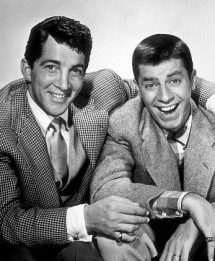
(by Ted Heller) (2012)
“Dying is easy: comedy is hard.”* As is tragicomedy, which Funnymen achieves magnificently. Presented in the literary version of cinéma vérité, the book recounts (to a diligent interviewer called ‘Ted’ via sound-bites from a cast of over a hundred characters) the life and career trajectory of Sigmund Blissman (aka Ziggy Bliss) and Vittorio Fontana (aka Vic Fountain), who hook up in the Catskills and take their haywire mugging, kvetching, crooning act on the club circuit in the ’40s, forming a team that puts them on the top, from the Copa to Vegas to Hollywood and all points of the compass.
Along the way lie treacherous bandleaders, groupies, wives, ex-wives, agents, critics, nightclub owners, film-studio execs, magicians, musicians, drug addicts, homosexuals, forlorn offspring, minders and hangers-on, the lot, a dense cabal nearly all of whom have walk-ons and contribute to a rich pastiche of the slice of garish, grubby, funny-sad Americana that was its popular culture in that time. Whilst Fountain and Bliss are strongly redolent of Martin and Lewis (see main image & below), the author’s great achievement is to render them as genuinely lifelike, their own people, even when they seem larger than life.
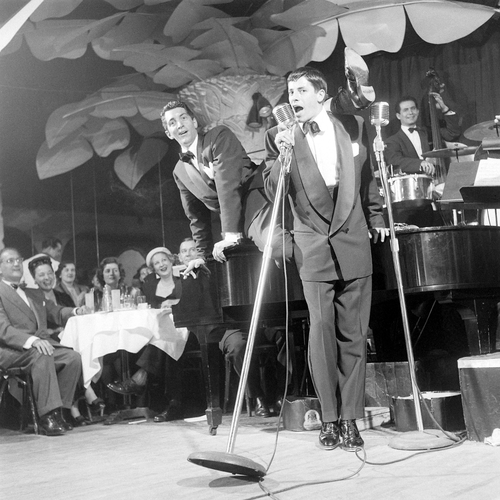
At the Copa in 1949.
Vic’s ‘appeal’ is straightforward enough: the smooth Italian lothario-look, the turquoise hair, the lazy, insouciant, throwaway singing style, the casual aspect: one hand permanently clutching a Chesterfield or a scotch, the other up someone’s skirt. Bliss (like Lewis, whose appeal we still can’t fathom – his only decent film is King of Comedy, in which he isn’t comic at all) is more complex: an ugly Jewish misfit with a guilt complex, megalomania, and resentment issues. He’s a paranoid but then there are the lovely moments when the sun breaks through the clouds and self-awareness, then even kindness, make a break from cover. Vic and Ziggy have a love-hate relationship that grows over time to hate-hate, and finally, in their dotage, acceptance.
You’ll need to consume this Dickens-rich, Richardson-dense, Rabelais-ribald work for yourself, but here are some snippets that hopefully serve as an amuse-bouche:
Vic said to him, “Ernie, I don’t care if you like boys, girls, black, white, purple, or sheep or cats. You just keep cranking out them songs. Oh yeah. And just keep your paws offa me.”
—
“What would your parents want you to do, Ziggy?” I asked him. “That’s really a moot point now,” he answered.
—
“[He] sent flowers to Lulu when he returned [to Codport] and got her a nice hat with a kind of fur trim. That really bowled her over. Lulu’s first boyfriend was Vic Fountain. And her last.”
—
“When we heard Vic talking on the radio it was just amazing. It was the first time Papa ever really paid attention to the radio other than to shut it off or listen to Mussolini or the NBC Symphony. He was so proud.”
—
“I’ll sing. I’ll play with the kid. I’ll do whatever. The only paperwork I want you to give me has George Washington on it.”
—
“Jack Klein and Sally had been at Ciro’s the night before and Jack was laughing so much he’d had a mild heart attack. He would be okay, though, she told me, unlike the man three nights before who had seen the show, gotten in his car with his wife, and was still cracking up so much he drove head-on into another car and killed two people.”
—
“I’ve known a lot of funny people who weren’t ever in any kind of agony, who weren’t ever miserable or lonely, and I’ve known lots of unfunny people, believe me, who were.”
—
“I have to admit, I was getting nervous. I didn’t really know if he was on the stage. “Jesus, do something,” Arnie softly muttered. But Ziggy was so funny that he could make silence hysterical, and people started laughing. And he let them laugh. “It was like silence was his partner now”…”
—
“”You were very, very funny,” I told him, and when I got into my car I almost started to cry.”
—
“He and Ziggy ran into each other that day, in the Sunset Lounge. They had Ziggy on medication, to take him off all them pills he was taking. He didn’t look any more like the Ziggy I’d seen on the TV than I did. He just looked like a little bent-over bald Jewish man to me.”
—
“I sunged ‘Malibu Moon’ without you Vic,” Ziggy said, “I’ll have you know.” “Oh yeah? How’d it go over?” “Well, for the first time ever, the audience was awake at the end of it.”

RocKwiz Salutes Eurovison (2021)

Adelaide Cabaret Festival, 25 June 2021
We thought nothing could stop the Eurovision Song Contest. The plastic glitter tv extravaganza that has been jauntily assaulting our eyeballs, ears and self-respect since 1956 is proof against international conflict, political controversy and stage-bombers. But a little virus from a non-competing country cancelled the contest in 2020 and Eurovision tragics had to content themselves with The Story of Fire Saga . The SBS music quiz tv show RocKwiz is keeping the legend alive in 2021 for those Australians who cannot travel. From the Gershwin Room in St Kilda’s Esplanade Hotel in Melbourne to the Festival Theatre in Adelaide they travelled, despite everything, for the 2021 Cabaret Festival. Brian Nankervis, Julia Zemero (the antipodean queen of Eurovision – joint narrator with Sam Pang for 8 years), the RocKwiz Band, Angus the shirtless scorekeeper and all.
Following the usual format, four audience members qualified to join the celebrities on the two panels. They were three people eligible for the Astra-Zeneca jab and the teenage Max who, in year 10, knows far more about Eurovision than is good for anyone.
Jay Zee dazzled in a gold wizard dress and a Kate Miller-Heidke crown which, she claimed, she put together at Spotlight. The crowd was wowed by the Eurovision-relevant celebrities; Montaigne, fresh from her near miss, performed “Technicolor” superbly, disappearing for a while to allow Adelaide’s own Hans – who, we are told, is Australia’s 2022 Eurovision entrant – to outdo JayZee in the sequin department, spinning and sashaying through “Cabaret” before joining the panel and adding nothing at all to their score. Alan Cumming, the director of the Adelaide Cabaret Festival stoutly stood in for in Dami Im – true Eurovision royalty – who fell victim to timetable conflicts and COVID entanglements. He did a ripping version of “Mein Herr” from Cabaret. Renowned guitarist Olympia gave us Dami Im’s “Sound of Silence”, a little shrilly.
The questions ranged from the piece of cake, “‘which Icelandic country has not yet won Eurovision?” to the less cakey, ”what was unusual about the song with which Sandie Shore won for England in 1967?” (No, it’s not just that England heaved itself up from ‘nul points’, to which it returned in 2021. It was the first English-language winning entrant). Max knew almost all of the answers. TVC foresees dry ice and contortionists in his future.
The audience’s response to it all was delighted hand-waving and answer-shouting. Everyone delighted us at the end with an ABBA song which need not be named, complete with side turns from Hans and Alan and a finale of “Volare” (3rd place in 1958).
Continue Reading →ERN – Australia’s Greatest Hoax

Festival Theatre, Adelaide, 25 June 2021
First, the back story. The Ern Malley affair is Australia’s most famous literary hoax. Max Harris was a precocious Adelaide poet who edited Angry Penguins, a literary review in the style of the Wyndham Lewis-inspired Blast from several decades before. A couple of traditional poets, Harold Stewart and James McAuley, on a slow day in 1943 at the Melbourne barracks where they were stationed, fabricated a brief folio of poems by an obscure artist, Ern Malley, who had died tragically at the age of 25. Imitating the modernist poetry they despised, the hoaxers wrote hilariously bad and hackneyed verse in the ‘new’ style. They also confected a letter from Ern’s sister, Ethel, to Harris, enclosing the collection and stating humbly “I am no judge of it myself...”
Unfortunately, this ‘discovery’ was to have no bittersweet ending such as the publication of A Confederacy of Dunces. Harris was enchanted and thrilled with the collection, seeing in them authentic traces of Kafka, Owen, Rilke (yes and no doubt Eliot, Pound and Rimbaud besides). Nearly all artistic work is derivative, of course, but Harris should have dug a bit deeper before going out and publishing an entire edition dedicated to the genius of Ern: all that came of it were opprobrium and ridicule, an early end to his poetical ambitions, the eventual folding of an heroic literary periodical and a 1944 conviction for publication of ‘indecent’ material (£5 fine; £21/11 costs).
Malley’s faux oeuvre did not vanish, however (unlike the original manuscript that, intriguingly, did). In fact, many artists, poets and critics regarded the surreal effusions and literary allusions as having real value, and they would in time provide inspiration for a new generation of poets as well as poetasters. Which brings us to last Friday evening.
ERN: Australia’s Greatest Hoax, was created by the singer/songwriter Max Savage in collaboration with composer Ross McHenry and realist oil painter Josh Baldwin. A mini concert of songs that alternated between the leisurely long works of Peter Gabriel and the white-hot concise rockers of punk and grunge, Savage and his entourage synthesized rather than transcribed the works of Malley, the painting created during the performance a sort of obbligato to the music. The Varnished Culture, revisiting Malley’s poems later, couldn’t detect them in the actual lyrics presented on the night but no matter – the homage was symbolic rather than literal.
Savage has a real presence, a raw but clear voice reminiscent of Tom Waits singing Tom Traubert’s Blues, and a stage presence hovering between Joe Cocker getting-into-the-song, and a swaggering-and-exhorting-of-band á la Mick Jagger. The band was very smooth and handled the cut-up style of the songs (jazz, rock and roll, country and soul thrown into the pot): they were: Julian Ferraretto (violin), Brenton Foster (piano), Ross McHenry (Bass, Moog), Steve Neville (drums), Adam Page (clarinet) and Django Rowe (lead guitar, banjo). Unfortunately, we had to leave about 10 minutes early to attend another show, so we trust we have done the performance justice: A solid effort.
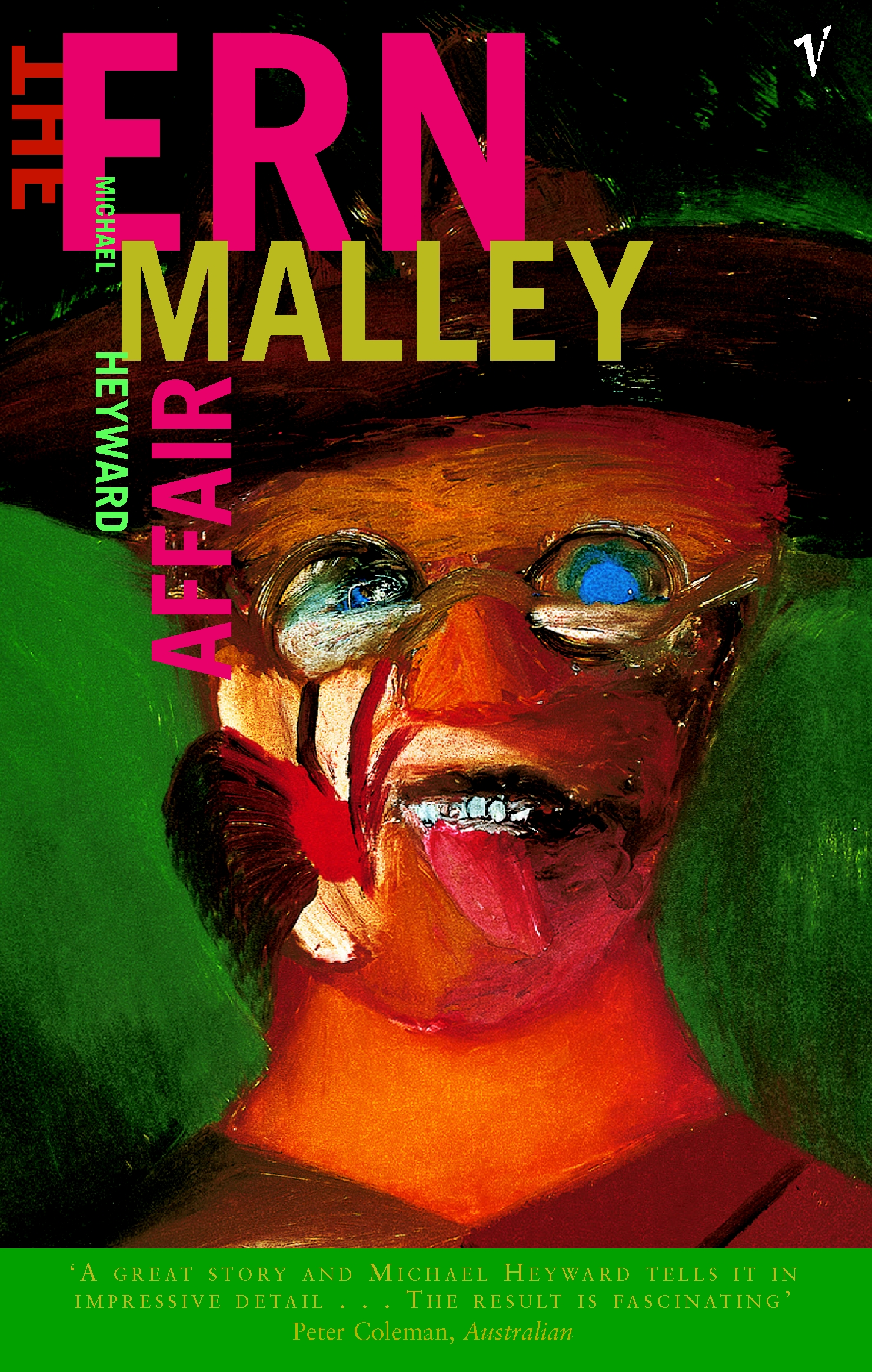
You can read all about the hoax in Michael Heywood’s 1993 book, the cover featuring Sydney Nolan’s “portrait” of Ern (aptly housed in the Art Gallery of SA)
Cabaret
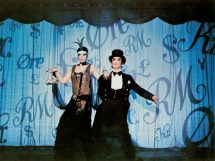
(Directed by Bob Fosse) (1972)
Adelaide Cabaret Festival, 24 June 2021
Inspired by the Weimar work of Christopher Isherwood, Cabaret is perhaps the last great movie musical. A brilliant rendering of the last days of chaotic democracy in Germany, the long shadows of Nazism entering stage left, the Kit Kat Klub becomes a trope for the death of heady, insouciant decadence, about to be replaced by something far more depraved. Fosse’s direction is faultless, as are the period feel and production values.
The cast is superb, led by Liza Minnelli, perfect as the brash and wide-eyed Sally Bowles, an American making her way in Berlin, man by man; with Joel Gray as the Mephistopheles who will doubtless lose his Faustian bargain; Michael York in the Isherwood role as ‘Brian’, and Helmut Griem as the debauched aristocrat, Maximilian. In a sub-plot, crypto-Jewish Fritz (Fritz Wepper) woos Jewish Natalia (Marisa Berenson), which causes complications in a country soon to be subject to the Nuremberg laws.

ménage à trois
The musical numbers and choreography are terrific, symbolizing the era and serving as faux narrative. Particularly good are Gray’s knowing and humourous “Willkommen,” “Two Ladies,” “Tiller Girls,” and the creepy “If You Could See Her“; Liza’s dramatic “Mein Herr,” “Maybe This Time,” “Money, Money” (with Gray) and her great finale in the title track. And then there’s the terrifying yet stirring song outside a gasthaus, “Tomorrow Belongs to Me,” roundly belted-out by a Hitler youth, in which almost the entire throng joins with annihilating fervour, prompting Brian to ask complacent nobleman Max as they decamp: “Do you still think you can control them?” The film’s finale reminds us of the answer to that question.
Cabaret remains the grandest musical outside the genre’s golden age.
A special screening of Cabaret enabled us to revisit the film in its proper setting. With a guest appearance by Adelaide Cabaret Festival darling Kim David Smith (looking appropriately louche – see below), we were invited to “dress the part, bowler hat and suspenders in an immersive experience” à la The Rocky Horror Picture Show. Some ladies did that in spades, even trying to get a ‘Songalong‘ going during Liza’s eponymous finale. KDS, now a resident of NY, introduced the film à la Joel Gray and explained how he had loved it and channeled Sally Bowles from an early age in his beautiful hometown of Traralgon (if you can make it there, you can make it anywhere). His voice is very good and while doing a take from the title song (“Put down the knitting, the book and the broom“) he asked the musical question ‘why did you bring a broom?’ All up, a lovely evening.
Continue Reading →Chekhov Goes Feral at The Belvoir – The Cherry Orchard

(Reviewed by our learned NSW correspondent, Margo Jakobsen)
The Cherry Orchard by Anton Chekhov, Belvoir Theatre, June 2021 – directed / adapted by Eamon Flack
The burning question is about the adaptation of The Cherry Orchard. The Larrikin tradition was evoked.
Examples: the Zumba style dance, the MC calling the partygoers a bunch of c..ts, the f…k you conga line. Missing the subtle humour of the original, the 2 ladies next to me left at interval. [I’d probably have joined them – Ed.]
The audience, a full house, was split between those of penshionable age and secondary students. In their innocence, the latter were shocked by the sexual references and not shy about expressing themselves. The atmosphere was raucous and fun. Enjoying the real-life personality of Pamela Rabe in the Q&A after the show, I’d like to have seen more of that power in her portrayal of the flawed matriarch, and not the more fragile one asked for by the director. Diversity was clearly a priority in the casting. New, fresh, a must-see!
Continue Reading →The Man Who Shot Liberty Valance
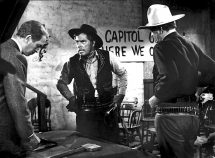
(Directed by John Ford) (1962)
We accept violence in the defense of life, liberty or country, on the sports field, or in delivering the brutal, hurtful truth. We get all of this, in various forms, in John Ford’s most intriguing film. When it first came out, the critics hated it – ‘dull’ and ‘predictable’ was the general consensus. But after one gets over the shock of James Stewart playing a young law student, or John Wayne wooing young-enough-to-be-his-daughter Vera Miles, we can see that this film is really a classic, the Monolith of all westerns*, focused on the genre’s key trope, the old ways giving-in to the new, save only for myth: “This is the West, sir. When the legend becomes fact, print the legend.” That statement doesn’t make sense as read, but when you watch the film, it makes perfect sense. A lie can travel around the world while the truth is still putting on its boots, but living a lie makes for a life of sadness.
“Liberty Valance is the toughest man south of the picket wire…next to me.”
Shinbone is a frontier town. What would bring an important man, a Senator (Stewart), here, all the way from Washington? So ask the press men from the local newspaper, and their curiosity is piqued further when they find Senator Ransom Stoddard is attending the funeral of obscure rancher Tom Doniphon (Wayne), lying forgotten and bootless in a plain pine box. After all, Stoddard is the State’s most famous son, a driving force behind statehood who stared down the greedy cattlemen, an elected official of good standing, and most crucially, the man who shot evil thug Liberty Valance (a great and savage Lee Marvin) – why someone didn’t shoot him earlier is unexplained, although he is a scary guy and seems to have affluent backers. And why does the Senator’s wife Hallie (Miles) wear such a haunted expression?
To learn the answers to these questions, we have to go back a generation (which in Hollywood, means a ‘flashback.’) Shinbone was not then a cute little town; it was a dirty hole, tended by a useless coward of a sheriff (a raspy, comic Andy Devine), ruled by Valance, a gun-slinging Caligula who robbed and pushed people around with impunity. Stoddard’s introduction to the region consists of being robbed, whipped, and having his law-book shredded by Liberty and his goons (or as Dutton Peabody would express it, ‘his myrmidons‘, played by Lee Van Cleef and Strother Martin). Recuperating under the tender mercies of restauranteurs Pete and Nora (John Qualen, Jeanette Nolan), Ranse has his eye on illiterate waitress Hallie, who regards her ‘Pilgrim’ as preferable to crass rancher Tom, despite the lovely sun-room he is building, and because of lines like: “You’re awful pretty when you get mad.”
When Ranse hangs up his shingle and starts civilisin’ the folks, Valance objects, monstering the town’s journalist (Edmond O’Brien) and eventually calling on the ‘young’ man to face him and draw. We won’t relate what happens, but there is a twist, which is revealed later and torments certain characters for half a lifetime. And John Wayne ends up lonesome, a bit like in The Searchers. The ending seemed to us entirely satisfactory, wistful, and apposite.
The film is at times just a little too leisurely, a smidge too long, but then, we can’t think what should be cut. Moreover, its broad, unhurried pace enables us to take in the richness of a saga which covers much more than a love triangle. Valance and Doniphon represent the Old West, passing into history (i.e. myth). Shinbone is learning how to read, exchanging guns for the power of the press, exercising its vote, and going to law, not war. Of course, women are still confined to the kitchen, and black servant Pompey (Woody Strode, in a fine performance) has to wait outside while the white folks eat, drink or vote, but then, equal rights were still a hundred years away. ‘”That all men are created equal.” That’s fine, Pompey.” “I knew that, Mr. Rance, but I just plumb forgot it.” “Oh, it’s all right, Pompey. A lot of people forget that part of it.”
“Nothing’s too good for the man who shot Liberty Valance.”
Guns and booze, those great consolations of American life, loom large. (“Courage can be purchased at yon’ tavern!”) The local doctor is a drunk. The newspaper editor is a drunk. The Sheriff is a drunk, and it doesn’t even give him courage. One of our favourite scenes features Tom teaching Ranse how to shoot, and how to cheat. It reveals the lawyer’s emerging defiance, and also that he throws a good punch. The Man Who Shot Liberty Valance mops up all of the clichés of western movies (and then some), dips them in warm gravy and spoons them in with mashed potatoes, but this is a meal that ‘sticks to the ribs’. Wonderful stuff.
The Gene Pitney song (by Burt Bacharach and Hal David) was recorded shortly after the film’s release, but is an impressive and accurate summary of the story…
Please Don’t Go: I Think You Should Leave
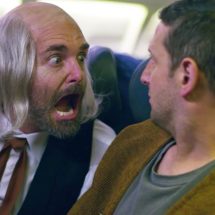
I Think You Should Leave (By Tim Robinson, et al) (Netflix, 2019)
The Varnished Culture has long been a fan of the Theatre of Embarrassment. I Think You Should Leave, created and driven by newcomer Robinson, adds demented anger and Kafkaesque punishment to embarrassment, and it’s the funniest thing in years.
A collection of sketches involve a central character who is the carnal embodiment of the current zeitgeist, in terms of obsessive egotism, transferred anger, rampant obscurantism, excessive fussiness and florid querulousness. We cannot wait for a commissioned but Covid-delayed second series.
Our favourites:
- The job applicant, meeting at a café, refuses to accept that you exit by pushing rather than pulling the door (he just failed the interview) [below top right];
- The old-timer on the plane, waiting since 1982 to exact his revenge on a fellow passenger [main image];
- The man in the hot dog costume, having driven his weiner-mobile through a shop window, avoids censure by observing how we don’t take the time to interact with our fellow man anymore…”we’re so – buried in our phones…”
- The Ford focus group [below top left] demonstrates that there MAY BE some wrong answers, after all;
- Dan Vega’s Mega Money Quiz [below, bottom left] is a format badly needing work. In particular, “Chunky” has to figure out what he does;
- After laser spine surgery, folks can spin their wives again, play with their dogs again…or get their “money back from Robbie Star at Superstar Tracks Records…” (“Moon River rock; Moon River roll…”);
- [Below, bottom right] A birthday party gift-giving bizarrely rebounds on the host in an appalling manner…

Ship of Fools
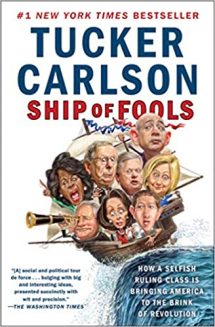
(By Tucker Carlson) (2018)
The brilliant TV pundit Carlson (one of the few Americans in the public square who understand irony) is perhaps better on screen than in print. Still, this is an amusing, engaging, stimulating and un-footnoted overview of America’s political and corporate elites, and how they, like the Emperor with no clothes, disport their naked ambition with a staggering immunity from introspection. Carlson is a rock-solid conservative, and has plenty to say about American liberal idiocy and childishness, but that doesn’t mean he can’t or won’t train a metaphorical AR-15 on the Republican Party as well. In fact, his thesis (a fortiori 3 years after the book came out) is that there is a rift in America, not along party or factional lines, but “between those who benefit from the status quo, and those who don’t.” In other words, a dangerous state of affairs, a class system (the very concept is uncomfortable to Yanks) as “institutionally torpid, economically immobile, culturally atrophied and socially stratified“* as the Ancien Régime in 1789 France.

Written in the breezy and familiar American style, the author gives us a fact and opinion overload (again, we say, sans footnotes), making clear that whilst he’s no Trump fan, the forces that produced him, did him down and now replace him, are far less palatable. In 2021, the U.S. is in crisis: entropic decline of its international stature, sagging under the weight of public debt so terrible that no-one mentions it, growing class divisions fomented by a insouciant and ignorant cabal of the nouveau riche, cities on fire, race-baiting, flourishing inflation, gashed and breached national borders (physical and digital), contempt for traditional values and authority, a vibrant cradle of lies in the public square, a pliable and narcoleptic Fourth Estate (and President), an Orwellian suppression of dangerous ideas via monopolistic social platforms and mob rule. Amid this catastrophic environment, President Biden‘s carers act like Emperor Nero. And the Republicans seem to sulk and wait for Joe and Kamala to self-immolate.
Plenty of people hate Carlson but everyone needs to hear what he has to say, because a lot of it makes sense and sense is valuable even when it bruises. In what Democrats celebrate as America’s ‘diversity,’ in cities throughout the country nervously marketed by real estate agents as ‘vibrant,’ Carlson asks why a country with no shared language, ethnicity, religion, culture, or history would remain a country. Here are some sample quotes from Ship of Fools on the various issues arising from that premise:
“Trump’s election wasn’t about Trump. It was a throbbing middle finger in the face of America’s ruling class…
“Free speech is the enemy of authoritarian rule…That’s also why our ruling class seeks to crush it.”
“The meritocracy, it turns out, creates its own kind of stratification, a kind more rigid than the aristocracy it replaced…In Chelsea Clinton’s world, nobody tells her she’s wrong…The best thing about old-fashioned liberals was how guilty they were. They felt bad about everything, and that kept them empathetic and humane. It also made them instinctively suspicious of power, which was useful. Somebody needs to be.”
[For the elites, illegal immigration is] the perfect arrangement. You get to feel virtuous for having a housekeeper; she walks the dog while you’re at SoulCycle. You can see why affluent moms tended to hate Donald Trump and his talk of building a wall. For Americans in the top 20 percent of income distribution, mass immigration is one of the best things that ever happened – cheap help, obedient employees, more interesting restaurants, and all without guilt. There’s no downside, at least none that you personally experience. You don’t take the bus or use the emergency room for health care or send your kids to overpopulated public schools that have canceled gym and music to pay for ESL because half the kids can’t speak English.”“Elites choose to live in cocoons white enough to burn your retinas…Meanwhile, the identity politics they espouse makes the country easier to govern, even as it makes it much harder to live in.”
“[When Edward] Kennedy…an absolutist on legal abortion…died in 2009, feminists celebrated his life. The Huffington Post ran a piece asking, ‘What would Mary Jo Kopechne have thought of Ted’s career?” Its conclusion: “Maybe she’d feel it was worth it.” Mary Jo Kopechne had become an abortion martyr.”
“It is possible to isolate the precise moment that Trump permanently alienated the Republican establishment in Washington: February 13, 2016. There was a GOP primary debate that night in Greenville, South Carolina, so every Republican in Washington was watching. Seemingly out of nowhere, Trump articulated something that no party leader had said out loud. “We should never have been in Iraq,” Trump announced, his voice rising. “We have destabilized the Middle East.” Many in the crowd booed, but Trump kept going: “They lied. They said there were weapons of mass destruction. There were none. And they knew there were none.”
“Politically, the decision to become a prowar party paid huge dividends for Democrats. From 1968 through 1988, Democrats decisively lost five presidential elections and narrowly won another. Since Clinton took the party back in a hawkish direction, the Democrats have lost the popular vote only once, in 2004…With both parties aligned on the wisdom of frequent military intervention abroad…America has remained in a state of almost permanent war…Less than a year into his first term, Obama was awarded the Nobel Peace Prize, apparently for the transcendent achievement of not being George W. Bush. But the prize had no lasting effect on Obama.”
“No matter how often they’re [the foreign policy establishment] wrong, no matter how many disasters they unintentionally create, they never seem to feel bad about it. They certainly never blame themselves.”
“The core belief in transgenderism is that biology isn’t real: sex is not determined at the DNA level; it’s determined by appearance…It’s a measure of how bovine our ruling class has become that educated people fall for nonsense like this especially hard. Employees of Facebook came up with more than seventy gender choices for their site. The choices include asexual, gender neutral, polygender, agender, bigender, gender fluid, gender variant, neutrois, pangender, transmasculine, as well as something called two-spirit…There’s not a person on earth who could define all of these categories. Some of them don’t really have definitions. It doesn’t matter. Their legitimacy is defended with determined ruthlessness by the arbiters of gender politics…the small group of unhappy people in charge…”
“With every passing year, the goals of the environmental movement became steadily more abstract…Environmentalism as a religion is more compelling than environmentalism as a means to save birds or clean up some river in Maine…Few preachers live up to the standards they set from the pulpit, and [Leonardo] Di Caprio is no exception. In the summer of 2016, Di Caprio was scheduled to receive an [environmental] award…He was in Cannes attending the film festival at the time, so he chartered a private jet to fly from France to New York and back…Billionaire investor Richard Branson tells audiences not to “be the generation responsible for irreversibly damaging the environment” with carbon. To spread that message, he travels on his own Dassault Falcon 50EX…Caring deeply is the only measure that matters. That’s why their consciences remain untroubled, no matter how many times they violate the standards they demand of others. Once you understand this, the Paris climate accord makes sense. An international agreement designed to curb carbon emissions, negotiated next to Europe’s busiest private airport. Nobody in attendance flew commercial. Nobody seemed to feel bad about it, either.”
“You can’t enforce enlightenment by fiat.”









